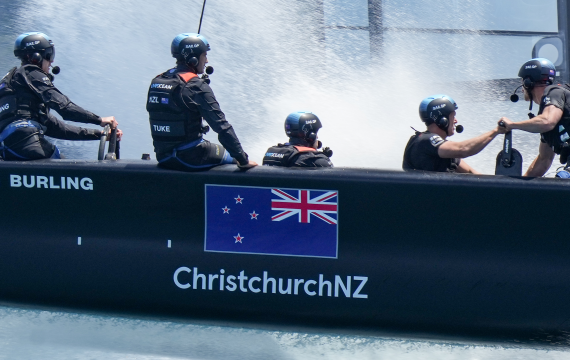Watching adrenaline-pumping fleet racing at break-neck speeds with 50-foot foiling cats is a world-class spectacle beyond comparison, a whole new level of high-performance sport. But the philosophy behind SailGP is a global race of a different kind, and coming second is not an option.
“What sealed the sponsorship deal for us was SailGP’s sustainability vision. They have put environmental and social sustainability at the heart of everything they do, and that’s perfectly in line with our vision for ITM and the local communities we work with,” says Darrin Hughes, CEO of ITM.
“SailGP has developed the event intending to be the most sustainable sport in the world. And the kiwi team is right up there pushing the same initiatives with their charity partner, Live Ocean Foundation.”
Not moving fast enough
Burling and Tuke established Live Ocean because they were concerned for the health of the ocean and the life in it. Through their sport, they champion action for the ocean, taking the message of ocean health and restoration to the world.
SailGP fans will be familiar with the charity – prominently displayed on the wing of the New Zealand team’s F50, Amokura as the team’s official ‘Race for the Future’ partner.
The Kiwis compete for prize money to support the foundation’s work through SailGP’s worldfirst Impact League. The award-winning initiative sees teams compete not only on the water, but off the water too – scored against positive social and environmental actions.

The NZ SailGP F50 catamaran
KEY FACTS. THE BOATS. THE TEAMS.THE ATTITUDE.
The boats:
SailGP’s F50 catamarans are built for speed, regularly reaching speeds of over 80km/h. With nine teams made up of the best sailors in the world, all on the same course at once, the competition is fierce.
Best of all, being one-design boats, the F50s are identical, everyone’s racing on a level playing field. Winning comes down to skill, talent and teamwork, and who can harness the power of nature best on the day.
The contest:
The global championship visits world-class venues around the world – including, for the first time this year, Christchurch (18-19 March 2023) with the inaugural Auckland stop scheduled for March 2024.
Each event comprises a series of two-day fleet races, culminating in the final showdown where the three top teams match up in one thrilling do-or-die race to determine the event champion.
The event in Christchurch will be critical for all the teams as it is the last regatta in the series before the grand final in San Francisco in May 2023.
The crews:
There are nine teams in the global SailGP series, crewed by some of the most successful sailors in the world, including Olympic medallists, America’s Cup legends and world sailing championship winners.
An integral part of SailGP is that each crew includes male and female athletes – with women racing in the role of ‘Strategist’ or helm assist.
For more information on the teams and current leaderboard, go to www.sailgp.com
The attitude:
While competition among the teams is intense, one attitude unites them: their commitment to raising awareness about global issues.
Right from the start, the overriding objective of SailGP was to build an international sporting series that is ultimately 100% sustainable in terms of environmental considerations. In recognition of this, the SailGP competition was declared the winner of the prestigious BBC Green Sports Awards in 2022.
“It’s the type of sailing that once you put your helmet on, you have to be switched on every time. Your adrenaline is pumping for as long as you’re racing”.
“100% PURE ADRENALINE.”
What’s it like racing on a supercharged 50-foot hypercat? Here’s how New Zealand SailGP Team strategist Liv Mackay describes it:
“It’s the type of sailing that once you put your helmet on, you have to be switched on every time. Your adrenaline is pumping for as long as you’re racing. Things can go wrong quickly, and the level of trust you need in those around you has to be high. And that’s what really bonds you as a team.
“The speeds you’re travelling at are phenomenal, and the g-forces are so strong – there are times when you’re trying to sprint across the boat, and you’re not actually moving anywhere. Other times, you’re collecting bruises being slammed from one hull to the other.
“On the first reach, I look around, and everyone’s sending it, pushing the boat to the edge of its limits, and you think, this can’t be real.
“It’s an experience that’s hard to describe in words. It’s like stepping into a whole different world; high-paced, exhilarating. I can’t get enough of it.”
